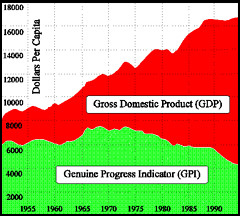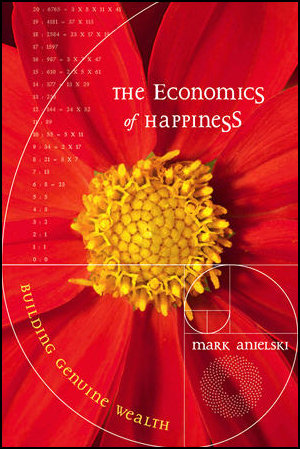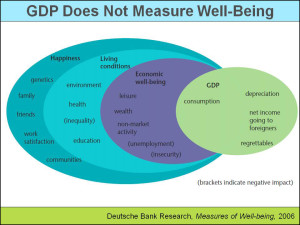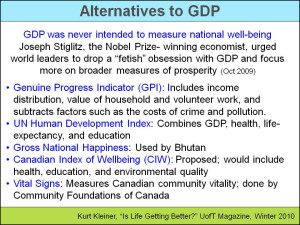5 Reasons Why a GPI Should Replace the GDP

Economists deny that Gross Domestic Product (GDP) was ever intended as a metric of overall country progress or well-being. However, that’s how it is being used. Leaders express alarm if the GDP—the value of all goods and services produced within a nation in a given year—falls. Countries are ranked by GPD or GDP per citizen, implying that countries with higher rankings are doing better overall than countries with lower rankings.
What nonsense. We need a better metric for improved quality of life and progress. We need a Genuine Progress Indicator (GPI) that accounts for not only monetized economic wealth but, more importantly, includes vital environmental and social factors. Here are five reasons why it’s time we replaced the GDP with a GPI.
1. The GDP only counts spendingAs progressive economist Mark Anielski says in “The Economics of Happiness,” the GDP measures what is produced, but ignores what is required to create that production. That’s why it is called a “gross” domestic product, not a “net” domestic product. It only celebrates one side of the ledger. If we ran our household budgets that way, the person who is the most bankrupt wins. The more a nation depletes or degrades its natural resources used to produce goods and services, the more the GDP goes up. The more we over-consume and drown ourselves in debt, the more the GDP rises. This is progress?
2. The GDP encourages layoffsNational economists warn of “productivity gaps” between their countries and others. They alert us to lack of adequate “productivity growth.” They measure productivity as GDP per hour worked. They encourage automation and more R&D so that we can produce more goods with fewer people. That means fewer jobs and higher unemployment. This is progress?
3. The GDP celebrates disastersAs the “What’s Wrong with the GDP” web page says: “Since the GDP records every monetary transaction as positive, the costs of social decay and natural disasters are tallied as economic advance. Crime adds billions of dollars to the GDP due to the need for locks and other security measures, increased police protection, property damage, and medical costs. Divorce adds billions of dollars more through lawyer’s fees, the need to establish second households and so forth.” This is progress?

4. The GDP omits what matters most
As Mark Anielski outlines in his above book, the GDP minimizes the value of expenditures on health care, education, social services, and environmental protection. It ignores democratic progress. It excludes the value of natural capital and the vital services provided by nature. It excludes the value of unpaid housework, child care, volunteer work and leisure. These are all good things that matter to us. If the GDP doesn’t count them, does the GDP count?
5. The GDP sets a bad example for businessesGovernments send signals of what’s important. They influence companies to track and do well on what they consider important enough to measure. The GDP is myopically focused on the economic aspect of the triple bottom line and ignores the environmental and social bottom lines. If the GDP doesn’t track all legs of the 3-legged stool of sustainability, why should companies?
The GPI, and other similar metrics listed in the adjacent slide, is a more complete, accurate, and holistic assessment of what we care about. It assesses the well-being / happiness / quality of life of citizens. Isn’t that what matters most? It’s time we had an adult conversation about what we track and celebrate. It’s time we tracked progress toward genuine social wealth, natural wealth, and economic wealth. It’s time for a GPI.
Bob







Comments are closed.